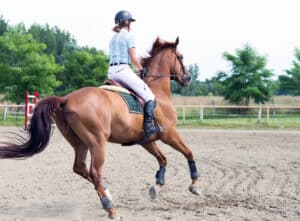EDWENA MITCHELL, well-known show jumping event director, has a few thoughts on warm up arena etiquette.
The number one grizzle I have is riders coming in and out of the warm up arena without acknowledging the marshal. It’s polite on entering an arena you know is stewarded or marshaled to give a little nod and say: “Hello, is it alright if I come in please?” Every warm up arena is different in size and we tend to put limits on how many are allowed in at any one time.
My next bugbear is when a coach or parent is getting cranky and yelling, or a wife or husband is offering loud and unsolicited advice. It’s very off-putting for all the other riders, particularly if there’s anger involved. It can be upsetting and nobody likes to see or hear that sort of behaviour.

Yet another concern is too many people at the practice fence. A rider is warming up, they have six people around them (there’s never enough room) and there’s mayhem! You need no more than one or two riders at the practice fence – any more and it just gets ridiculous. There’s pushing and shoving and that’s when accidents can happen.
I also have issues with people taking dressage whips into the warm up. You’re allowed a dressage whip for flatwork, but you can’t jump with one. There are a couple of riders in Australia who I will not let into the warm up with a dressage whip because they disregard the rule or they forget – and if I don’t catch it in time, there’s room for protests from other riders or the judge.
Which leads to the next point – rules! It’s all very well to say ‘know your rules’ and it’s not hard to find them, but if you’re a kid or a parent, or you’re new to the sport and not familiar with the lingo, interpreting them can be hard. Ignorance is not an excuse but if in doubt, ask a question, and if the marshal in your ring doesn’t know they can ask someone who does. I’m always happy to have a chat with people and explain the rules.
Many incidents in warm ups occur when riders are worried or afraid. Rather than being mindful of their surroundings, they’re focused on dealing with whatever they’re concerned about – a horse they’re not 100 per cent confident on, a course that might be a bit big – and their awareness of others riders and horses is lessened. A good marshall can help with a situation like this by requesting the combination be moved down the draw (although sometimes that’s not always possible) to give them a bit more time to overcome the problem.
My take home message is be polite to all – always!



